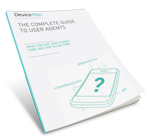
Updated for 2023 - Looking for User-Agent (UA) strings used by some of the most popular Samsung phones? In this article you’ll find a useful list of UAs which you can use for testing purposes in any environment.
Which Samsung phones are the most popular
Before you actually start testing your mobile setup using User-Agent strings, you may be wondering which Samsung phones are actually the most used around the world and thus the most useful for testing.
Industry analysts, such as IDC or Kantar, may not be helpful in this case because they mainly focus on shipments of new phones. What’s important for many online businesses is not really how many new phones are sold each quarter but which phones are currently used the most often for web browsing. DeviceAtlas statistics are more useful given that they’re based on real web traffic to a global network of partner websites.
User-Agent strings for Samsung devices
The User-Agent string is one of the HTTP headers meant to introduce the device requesting online content from the web server. The UA contains multiple product tokens which in theory should help to identify hardware and software of the visiting device. The reality of User-Agent strings is that the information is often misleading which is what makes home-grown device detection solutions inaccurate and ineffective. It also causes problems in terms of detecting iPhone models.
Here you can learn more about detecting devices by parsing User-Agent strings.
The following example User-Agent strings can be used for testing or any other purpose in your organisation. These UAs were the most popular for selected Samsung smartphones in 2023.
Galaxy A family
| Samsung Galaxy A52s 5G |
|---|
| Mozilla/5.0 (Linux; Android 13; SAMSUNG SM-A528B) AppleWebKit/537.36 (KHTML, like Gecko) SamsungBrowser/21.0 Chrome/110.0.5481.154 Mobile Safari/537.36 |
| Samsung Galaxy A53 5G |
| Mozilla/5.0 (Linux; Android 13; SAMSUNG SM-A536B) AppleWebKit/537.36 (KHTML, like Gecko) SamsungBrowser/21.0 Chrome/110.0.5481.154 Mobile Safari/537.36 |
| Samsung Galaxy A14 5G |
| Mozilla/5.0 (Linux; Android 13; SM-A146U) AppleWebKit/537.36 (KHTML, like Gecko) Chrome/106.0.0.0 Mobile Safari/537.36 |
| Samsung Galaxy A14 5G (WebView) |
| Dalvik/2.1.0 (Linux; U; Android 13; SM-A146U Build/TP1A.220624.014) |
| Samsung Galaxy A03s |
| Mozilla/5.0 (Linux; Android 13; SM-A037U) AppleWebKit/537.36 (KHTML, like Gecko) Chrome/106.0.0.0 Mobile Safari/537.36 |
Galaxy Note family
| Samsung Galaxy Note20 Ultra 5G |
|---|
| Mozilla/5.0 (Linux; Android 13; SM-N986U Build/TP1A.220624.014; wv) AppleWebKit/537.36 (KHTML, like Gecko) Version/4.0 Chrome/113.0.5672.162 Mobile Safari/537.36 |
| Samsung Galaxy Note20 Ultra 5G (WebView) |
| Dalvik/2.1.0 (Linux; U; Android 13; SM-N986U Build/TP1A.220624.014) |
| Samsung Galaxy Note10+ |
| Mozilla/5.0 (Linux; Android 12; SAMSUNG SM-N975F) AppleWebKit/537.36 (KHTML, like Gecko) SamsungBrowser/21.0 Chrome/110.0.5481.154 Mobile Safari/537.36 |
| Samsung Galaxy Note 9 |
| Mozilla/5.0 (Linux; Android 10; SAMSUNG SM-N960F) AppleWebKit/537.36 (KHTML, like Gecko) SamsungBrowser/21.0 Chrome/110.0.5481.154 Mobile Safari/537.36 |
The Complete Guide To User Agents.
Download our free e-book on User Agents to learn:
- What is a User Agent?
- How do you parse them?
- What can you do with them?
Galaxy S family
| Samsung Galaxy S23 Ultra |
|---|
| Mozilla/5.0 (Linux; Android 13; SAMSUNG SM-S918B) AppleWebKit/537.36 (KHTML, like Gecko) SamsungBrowser/21.0 Chrome/110.0.5481.154 Mobile Safari/537.36 |
| Samsung Galaxy S22 5G |
| Mozilla/5.0 (Linux; Android 13; SAMSUNG SM-S901B) AppleWebKit/537.36 (KHTML, like Gecko) SamsungBrowser/21.0 Chrome/110.0.5481.154 Mobile Safari/537.36 |
| Samsung Galaxy S22 Ultra |
| Mozilla/5.0 (Linux; Android 13; SAMSUNG SM-S908B) AppleWebKit/537.36 (KHTML, like Gecko) SamsungBrowser/21.0 Chrome/110.0.5481.154 Mobile Safari/537.36 |
| Samsung Galaxy S22 Ultra 5G |
| Mozilla/5.0 (Linux; Android 13; SM-S908U Build/TP1A.220624.014; wv) AppleWebKit/537.36 (KHTML, like Gecko) Version/4.0 Chrome/113.0.5672.162 Mobile Safari/537.36 |
| Samsung Galaxy S22 Ultra 5G (WebView) |
| Dalvik/2.1.0 (Linux; U; Android 13; SM-S908U Build/TP1A.220624.014) |
| Samsung Galaxy S21 5G |
| Mozilla/5.0 (Linux; Android 13; SAMSUNG SM-G991B) AppleWebKit/537.36 (KHTML, like Gecko) SamsungBrowser/21.0 Chrome/110.0.5481.154 Mobile Safari/537.36 |
Learn more about User-Agent strings
If you're looking for more information on User-Agent strings, please head over to another article on the DeviceAtlas blog listing some useful User-Agent strings. Also, have a look at this guide focusing on analysing UAs.



